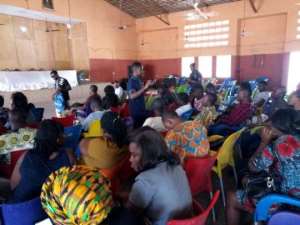
The Ghana National Household Registry (GNHR) has trained 157 District Coordinators and Supervisors in the Upper East Region to undertake its data collection exercise from February 26 to March 31 this year.
The three-day training schooled participants made up of 22 Coordinators and 135 Supervisors across all the 13 Districts in the Region, on the GNHR concept, its intended purpose, team management and coordination, how to gather quality data for the programme, manage and resolve issues including their daily roles among others.
As part of their roles in the exercise, they are expected to team up with District Liaison Officers to group the communities and ensure that public education is done before they moved into the communities to start the registration.
Ms Bertha Dzeble, the Operations Specialist of GNHR told the Ghana News Agency (GNA) at a training session in Bolgatanga, that there were three levels of field staff who would be directly involved from the District to the community level, and each District, depending on size would have either one or two Coordinators.
She said the Builsa South District, Nabdam and Binduri Districts would have a Coordinator each per their sizes, while the remaining ten would have two. 'In all, we have 22 Coordinators who are part of this training, we have divided the whole Region into 135 teams with 135 Supervisors because each team has one Supervisor and six enumerators,' she said.
Ms Dzeble said the Districts would be divided into clusters according to the number of teams, 'within each cluster there are a number of communities, so they would make sure that they move around these communities in a manner that would make travelling easy, proximity and size are key in putting them together.'
She said various languages spoken by the team members would be identified and matched according to the language spoken in a particular cluster, so that communication does not hinder the smooth process of the exercise.
She said Supervisors and Coordinators, the District Liaison Officers and the Community Focal Persons within a cluster, would prepare communities in batches 'because we are not going to be in all the communities at the same time, so depending on the size of the community, they may prepare communities for one week before registration.'
Ms Dzeble said the programme was structured in a way that Supervisors would always move ahead to new communities to meet with focal persons to sensitise members on the exercise before registration, so that no one would be left unregistered for lack of information.
Mr Barnabas Sackeyuah, the Kassena Nankana District Coordinator, on his part, said he was well prepared for the programme, and hoped that the media would disseminate the information to help the programme succeed.
He said registration in urban areas and on market days would be a challenge because many urban dwellers and traders may not be readily available for the exercise due to their daily activities.




 Supreme court declares payment of wages to spouses of President, Vice President ...
Supreme court declares payment of wages to spouses of President, Vice President ...
 Publish full KPMG report on SML-GRA contract – Bright Simons to Akufo-Addo
Publish full KPMG report on SML-GRA contract – Bright Simons to Akufo-Addo
 Kumasi International Airport to begin full operations by end of June
Kumasi International Airport to begin full operations by end of June
 Election 2024: Our ‘real challenge’ is getting ‘un-bothered’ youth to vote – Abu...
Election 2024: Our ‘real challenge’ is getting ‘un-bothered’ youth to vote – Abu...
 [Full text] Findings and recommendations by KPMG on SML-GRA contract
[Full text] Findings and recommendations by KPMG on SML-GRA contract
 Renegotiate SML contract – Akufo-Addo to GRA, Finance Ministry
Renegotiate SML contract – Akufo-Addo to GRA, Finance Ministry
 J.B Danquah-Adu murder trial: Sexy Dondon to Subpoena Ken Agyapong, Ursula Owusu
J.B Danquah-Adu murder trial: Sexy Dondon to Subpoena Ken Agyapong, Ursula Owusu
 Galamsey: Five Burkinabes jailed 20 years each for mining
Galamsey: Five Burkinabes jailed 20 years each for mining
 'It's no crime' – Abu Sakara defends Alan's exit from NPP
'It's no crime' – Abu Sakara defends Alan's exit from NPP
 'We know all your houses, pay your bills now or we’ll disconnect you; we're all ...
'We know all your houses, pay your bills now or we’ll disconnect you; we're all ...
